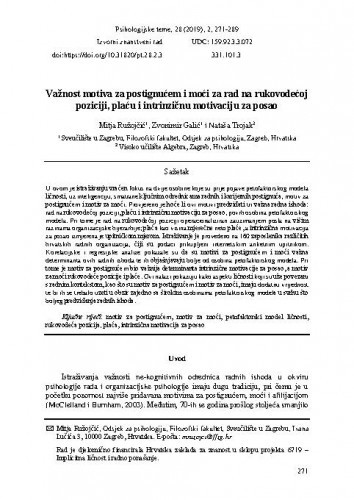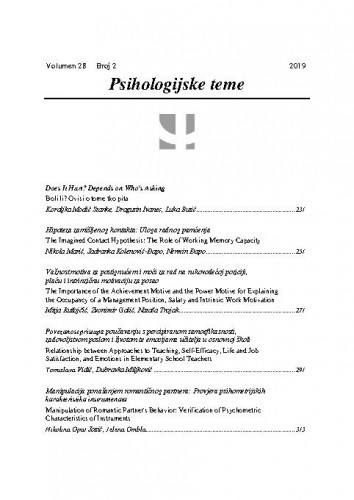U ovom je istraživanju vraćen fokus na dvije osobine koje su prije pojave petofaktorskog modela ličnosti, uz inteligenciju, smatrane ključnim odrednicama radnih i karijernih postignuća, motiv za postignućem i motiv za moći. Provjereno je hoće li ovi motivi predviđati tri važna radna ishoda: rad na rukovodećoj poziciji, plaću i intrinzičnu motivaciju za posao, povrh osobina petofaktorskog modela. Pri tome je rad na rukovodećoj poziciji operacionaliziran zauzimanjem posla na višim razinama organizacijske hijerarhije; plaća kao visina mjesečne neto plaće, a intrinzična motivacija za posao izmjerena je upitničkom mjerom. Istraživanje je provedeno na 160 zaposlenika različitih hrvatskih radnih organizacija, čiji su podaci prikupljeni internetskim anketnim upitnikom. Korelacijske i regresijske analize pokazale su da su motivi za postignućem i moći važna determinanta ovih radnih ishoda te ih objašnjavaju bolje od osobina petofaktorskog modela. Pri tome je motiv za postignućem bio važnija determinanta intrinzične motivacije za posao, a motiv za moći rukovodeće pozicije i plaće. Ovi nalazi pokazuju kako aspekti ličnosti koji su uže povezani s radnim kontekstom, kao što su motiv za postignućem i motiv za moći, imaju dodatnu vrijednost te bi ih se trebalo uzeti u obzir zajedno sa širokim osobinama petofaktorskog modela u svrhu što boljeg predviđanja radnih ishoda.; In this study, the focus of the research was shifted back to the two individual difference characteristics that were, before the appearance of the five-factor model, considered as key determinants of work and career outcomes next to intelligence: the achievement motive and the power motive. It was examined whether the two motives will predict three important work outcomes: occupancy of a management position, salary and intrinsic work motivation, over and above the five-factor model traits. The occupancy of a management position was operationalized as working at higher levels of organizational hierarchy and salary was operationalized as the amount of monthly net salary. Intrinsic work motivation was measured with a self-report questionnaire. The study was conducted on 160 employees of various Croatian work organizations and data was collected through an online survey. The correlational and regression analyses showed that the achievement motive and the power motive were important determinants of the work outcomes, explaining them better than the five-factor model traits. The achievement motive showed to be more important for intrinsic work motivation, whereas the power motive was more important for management position and salary. These findings show that individual difference characteristics which are more closely related to the work context, such as the achievement motive and the power motive, have considerable incremental validity and should be considered alongside the broad dimensions of the five-factor model in order to improve the prediction of work outcomes.
Sažetak

 Psihologijske teme : 28,2(2019) / glavna i odgovorna urednica Barbara Kalebić Maglica.
Psihologijske teme : 28,2(2019) / glavna i odgovorna urednica Barbara Kalebić Maglica.